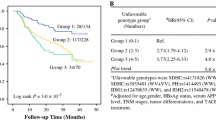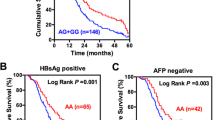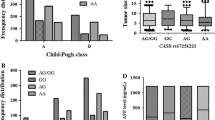Abstract
Metabolic reprogramming is an important hallmark of cancer cells, including the alterations of activity and expression in tricarboxylic acid (TCA) cycle key enzymes. Previous studies have reported the associations between tumor formation and three core enzymes involved in the TCA cycle. However, the association between functional single nucleotide polymorphisms (SNPs) in one of TCA cycle key gene isocitrate dehydrogenase (IDH) and the overall survival of hepatocellular carcinoma (HCC) patients treated with transcatheter arterial chemoembolization (TACE) has never been investigated. Five functional SNPs in IDH1 and IDH2 genes were genotyped using the Sequenom iPLEX genotyping system in a cohort of 419 unresectable Chinese HCC patients treated with TACE. Multivariate Cox proportional hazards model and Kaplan–Meier curve were used for the prognosis analysis. We found that SNPs rs12478635 in IDH1 and rs11632348 in IDH2 gene exhibited significant associations with death risk in HCC patients in the dominant model (HR 1.33; 95 % CI 1.02–1.73; P = 0.037) and in recessive model (HR 1.87; 95 % CI 1.27–2.75; P = 0.001), respectively. Moreover, we observed a cumulative effect of these two SNPs on HCC overall survival, indicating a significant trend of death risk increase with increasing number of unfavorable genotypes (P for trend = 0.001). Additionally, our data suggest that unfavorable genotypes of two SNPs may be used as an independent prognostic marker in those with advanced stage and patients with serum AFP <200 μg/L. Our results for the first time suggest that IDH gene polymorphisms may serve as an independent prognostic marker for HCC patients treated with TACE.


Similar content being viewed by others
References
Jemal A, Bray F, Center MM, Ferlay J, Ward E, Forman D. Global cancer statistics. CA Cancer J Clin. 2011;61(2):69–90. doi:10.3322/caac.20107.
Wei KR, Yu X, Zheng RS, Peng XB, Zhang SW, Ji MF, et al. Incidence and mortality of liver cancer in China, 2010. Chin J cancer. 2014;33(8):388–94. doi:10.5732/cjc.014.10088.
Forner A, Llovet JM, Bruix J. Hepatocellular carcinoma. Lancet. 2012;379(9822):1245–55. doi:10.1016/S0140-6736(11)61347-0.
Murata S, Mine T, Ueda T, Nakazawa K, Onozawa S, Yasui D, et al. Transcatheter arterial chemoembolization based on hepatic hemodynamics for hepatocellular carcinoma. Sci World J. 2013;2013:479805. doi:10.1155/2013/479805.
Bruix J, Sherman M. Practice guidelines committee AAftSoLD. Management of hepatocellular carcinoma. Hepatology. 2005;42(5):1208–36. doi:10.1002/hep.20933.
Raimundo N, Baysal BE, Shadel GS. Revisiting the TCA cycle: signaling to tumor formation. Trends Mol Med. 2011;17(11):641–9. doi:10.1016/j.molmed.2011.06.001.
Cardaci S, Ciriolo MR. TCA cycle defects and cancer: When metabolism tunes redox state. Int J Cell Biol. 2012;2012:161837. doi:10.1155/2012/161837.
Wallace DC. Mitochondria and cancer. Nat Rev Cancer. 2012;12(10):685–98. doi:10.1038/nrc3365.
King A, Selak MA, Gottlieb E. Succinate dehydrogenase and fumarate hydratase: linking mitochondrial dysfunction and cancer. Oncogene. 2006;25(34):4675–82. doi:10.1038/sj.onc.1209594.
Pollard PJ, Wortham NC, Tomlinson IP. The TCA cycle and tumorigenesis: the examples of fumarate hydratase and succinate dehydrogenase. Ann Med. 2003;35(8):632–9.
Reitman ZJ, Yan H. Isocitrate dehydrogenase 1 and 2 mutations in cancer: alterations at a crossroads of cellular metabolism. J Natl Cancer Inst. 2010;102(13):932–41. doi:10.1093/jnci/djq187.
Dang L, Jin S, Su SM. IDH mutations in glioma and acute myeloid leukemia. Trends Mol Med. 2010;16(9):387–97. doi:10.1016/j.molmed.2010.07.002.
Kang MR, Kim MS, Oh JE, Kim YR, Song SY, Seo SI, et al. Mutational analysis of IDH1 codon 132 in glioblastomas and other common cancers. Int J Cancer J Int du cancer. 2009;125(2):353–5. doi:10.1002/ijc.24379.
Yen KE, Bittinger MA, Su SM, Fantin VR. Cancer-associated IDH mutations: biomarker and therapeutic opportunities. Oncogene. 2010;29(49):6409–17. doi:10.1038/onc.2010.444.
Di Paolo A, Danesi R, Del Tacca M. Pharmacogenetics of neoplastic diseases: new trends. Pharmacol Res. 2004;49(4):331–42.
Zhao B, Lu J, Yin J, Liu H, Guo X, Yang Y, et al. A functional polymorphism in PER3 gene is associated with prognosis in hepatocellular carcinoma. Liver Int. 2012;32(9):1451–9. doi:10.1111/j.1478-3231.2012.02849.x.
Yuan P, Wang S, Zhou F, Wan S, Yang Y, Huang X, et al. Functional polymorphisms in the NPAS2 gene are associated with overall survival in transcatheter arterial chemoembolization-treated hepatocellular carcinoma patients. Cancer Sci. 2014;105(7):825–32. doi:10.1111/cas.12428.
Fu Y, Zheng S, Zheng Y, Huang R, An N, Liang A, et al. Glioma derived isocitrate dehydrogenase-2 mutations induced up-regulation of HIF-1alpha and beta-catenin signaling: possible impact on glioma cell metastasis and chemo-resistance. Int J Biochem Cell Biol. 2012;44(5):770–5. doi:10.1016/j.biocel.2012.01.017.
Xu Z, Taylor JA. SNPinfo: integrating GWAS and candidate gene information into functional SNP selection for genetic association studies. Nucleic Acids Res. 2009;37:W600–5. doi:10.1093/nar/gkp290 (Web Server issue).
Warburg O. On the origin of cancer cells. Science. 1956;123(3191):309–14.
Dalziel K. Isocitrate dehydrogenase and related oxidative decarboxylases. FEBS Lett. 1980;117(Suppl):K45–55.
Dang L, White DW, Gross S, Bennett BD, Bittinger MA, Driggers EM, et al. Cancer-associated IDH1 mutations produce 2-hydroxyglutarate. Nature. 2009;462(7274):739–44. doi:10.1038/nature08617.
Ward PS, Patel J, Wise DR, Abdel-Wahab O, Bennett BD, Coller HA, et al. The common feature of leukemia-associated IDH1 and IDH2 mutations is a neomorphic enzyme activity converting alpha-ketoglutarate to 2-hydroxyglutarate. Cancer Cell. 2010;17(3):225–34. doi:10.1016/j.ccr.2010.01.020.
Kaelin WG Jr. Cancer and altered metabolism: potential importance of hypoxia-inducible factor and 2-oxoglutarate-dependent dioxygenases. Cold Spring Harb Symp Quant Biol. 2011;76:335–45. doi:10.1101/sqb.2011.76.010975.
Leonardi R, Subramanian C, Jackowski S, Rock CO. Cancer-associated isocitrate dehydrogenase mutations inactivate NADPH-dependent reductive carboxylation. J Biol Chem. 2012;287(18):14615–20. doi:10.1074/jbc.C112.353946.
Oermann EK, Wu J, Guan KL, Xiong Y. Alterations of metabolic genes and metabolites in cancer. Semin Cell Dev Biol. 2012;23(4):370–80. doi:10.1016/j.semcdb.2012.01.013.
Balss J, Meyer J, Mueller W, Korshunov A, Hartmann C, von Deimling A. Analysis of the IDH1 codon 132 mutation in brain tumors. Acta Neuropathol. 2008;116(6):597–602. doi:10.1007/s00401-008-0455-2.
Bleeker FE, Lamba S, Leenstra S, Troost D, Hulsebos T, Vandertop WP, et al. IDH1 mutations at residue p. R132 (IDH1(R132)) occur frequently in high-grade gliomas but not in other solid tumors. Hum Mutat. 2009;30(1):7–11. doi:10.1002/humu.20937.
Mardis ER, Ding L, Dooling DJ, Larson DE, McLellan MD, Chen K, et al. Recurring mutations found by sequencing an acute myeloid leukemia genome. New Engl J Med. 2009;361(11):1058–66. doi:10.1056/NEJMoa0903840.
Sjoblom T, Jones S, Wood LD, Parsons DW, Lin J, Barber TD, et al. The consensus coding sequences of human breast and colorectal cancers. Science. 2006;314(5797):268–74. doi:10.1126/science.1133427.
Gaal J, Burnichon N, Korpershoek E, Roncelin I, Bertherat J, Plouin PF, et al. Isocitrate dehydrogenase mutations are rare in pheochromocytomas and paragangliomas. J Clin Endocrinol Metab. 2010;95(3):1274–8. doi:10.1210/jc.2009-2170.
Sequist LV, Heist RS, Shaw AT, Fidias P, Rosovsky R, Temel JS, et al. Implementing multiplexed genotyping of non-small-cell lung cancers into routine clinical practice. Ann Oncol. 2011;22(12):2616–24. doi:10.1093/annonc/mdr489.
Wagner K, Damm F, Gohring G, Gorlich K, Heuser M, Schafer I, et al. Impact of IDH1 R132 mutations and an IDH1 single nucleotide polymorphism in cytogenetically normal acute myeloid leukemia: SNP rs11554137 is an adverse prognostic factor. J Clin Oncol. 2010;28(14):2356–64. doi:10.1200/JCO.2009.27.6899.
Ho PA, Kopecky KJ, Alonzo TA, Gerbing RB, Miller KL, Kuhn J, et al. Prognostic implications of the IDH1 synonymous SNP rs11554137 in pediatric and adult AML: a report from the children’s oncology group and SWOG. Blood. 2011;118(17):4561–6. doi:10.1182/blood-2011-04-348888.
Wang XW, Boisselier B, Rossetto M, Marie Y, Idbaih A, Mokhtari K, et al. Prognostic impact of the isocitrate dehydrogenase 1 single-nucleotide polymorphism rs11554137 in malignant gliomas. Cancer. 2013;119(4):806–13. doi:10.1002/cncr.27798.
Acknowledgements
This work was supported by National Natural Science Foundation of China (No. 81302054, No. 81272522 and No. 81270505) and grants2011gr0239 from the International S & T Cooperation Program of China.
Conflict of interest
None declared.
Author information
Authors and Affiliations
Corresponding authors
Additional information
Huiqing Zhang and Xu Guo have contributed equally to this work.
Rights and permissions
About this article
Cite this article
Zhang, H., Guo, X., Dai, J. et al. Genetic variations in IDH gene as prognosis predictors in TACE-treated hepatocellular carcinoma patients. Med Oncol 31, 278 (2014). https://doi.org/10.1007/s12032-014-0278-z
Received:
Accepted:
Published:
DOI: https://doi.org/10.1007/s12032-014-0278-z




